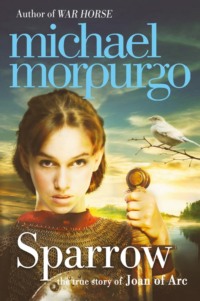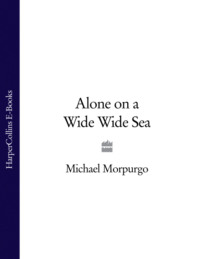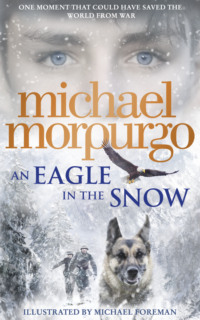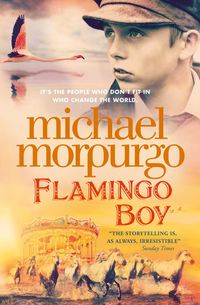
Полная версия
Morpurgo War Stories
By the time I get in there Little Les is lying on his side shot through the head, his eyes staring at me. He looks so surprised. Several Germans are sprawled across their dugout, all still, all dead — except one. He stands there naked, blood spattered and shaking. I too am shaking. He has his hands in the air and is whimpering. Wilkie throws a coat over him and Pete bundles him out of the dugout. Frantic now to get back we scrabble our way up out of the trench, the Hun still whimpering. He is beside himself with terror. Pete is shouting at him to stop, but he’s only making it worse. We follow the captain through the German wire and run.
For a while I think we have got away with it, but then a flare goes up and we are caught suddenly in broad daylight. I hurl myself to the ground and bury my face in the snow. Their flares last so much longer than ours, shine so much brighter. I know we’re for it. I press myself into the ground, eyes closed, I’m praying and thinking of Molly. If I’m going to die I want her to be my last thought. But she’s not. Instead I’m saying sorry to Father for what I did, that I didn’t mean to do it. A machine gun opens up behind us and then rifles fire. There is nowhere to hide, so we pretend to be dead. We wait till the light dies and the night is suddenly black again. Wilkie gets us to our feet and we go on, running, stumbling, until more lights go up, and the machine gunners start up again. We dive into a crater and roll down crashing through the ice into the watery bottom. Then the shelling starts. It seems as if we have woken up the entire German army. I cower in the stinking water with the German and Charlie, the three of us clinging together, heads buried in one another as the shells fall all about us. Our own guns are answering now but it is little comfort to us. Charlie and I drag the Hun prisoner out of the water. Either he is talking to himself or he’s saying a prayer, it’s difficult to tell.
Then we see Wilkie lying higher up the slope, too close to the lip of the crater. When Charlie calls out to him he doesn’t reply. Charlie goes to him and turns him over. “It’s my legs,” I hear the captain whisper. “I can’t seem to move my legs.” He’s too exposed up there, so Charlie drags him back down as gently as he can. We try to make him comfortable. The Hun keeps praying out loud. I’m quite sure he’s praying now. “Du lieber Gott,” I hear. They call God by the same name. Pete and Nipper are crawling over towards us from the far side of the crater. We are together at least. The ground shudders, and with every impact we are bombarded by showers of mud and stone and snow. But the sound I hate and fear most is not the sound of the explosion — by then it’s done and over with, and you’re either dead or not. No, it’s the whistle and whine and shriek of the shells as they come over. It’s the not knowing where they will land, whether this one is for you.
Then, as suddenly as the barrage begins, it stops. There is silence. Darkness hides us again. Smoke drifts over us and down into our hole, filling our nostrils with the stench of cordite. We stifle our coughing. The Hun has stopped his praying, and is lying curled up in his overcoat, his hands over his ears. He’s rocking like a child, like Big Joe.
“I won’t make it,” Wilkie says to Charlie. “I’m leaving it to you to get them all back, Peaceful, and the prisoner. Go on now.”
“No sir,” Charlie replies. “If one goes we all go. Isn’t that right, lads?”
That’s how it happened. Under cover of an early-morning mist we made it back to our trenches, Charlie carrying Wilkie on his back the whole way, until the stretcher bearers came for him in the trench. As they lifted him, Wilkie caught Charlie by the hand and held it. “Come and see me in hospital, Peaceful,” he said. “That’s an order.” And Charlie promised he would.
We had a brew up with our prisoner in the dugout before they came for him. He smoked a cigarette Pete had given him. He’d stopped shaking now, but his eyes still held their fear. We had nothing to say to one another until the moment he got up to leave. “Danke,” he said. “Danke sehr.”
“Funny that,” Nipper said when he’d gone. “Seeing him standing there with not a stitch on. Take off our uniforms and you can hardly tell the difference, can you? Not a bad bloke, for a Fritz that is.”
That night I didn’t think, as I should have done, of Little Les lying out there in the German dugout, with a hole in his head. I thought of the Hun prisoner we’d brought back. I didn’t even know his name, yet, after that night cowering in the shell hole with him, I felt somehow I knew him better than I’d ever known Little Les.
We are back at last at rest camp, most of us anyway. We soon find out which hospital Wilkie is in, and we go to see him as Charlie had promised. It’s a big chateau of a place, with ambulances coming and going, and crisp-looking nurses bustling everywhere. “Who are you?” asks the orderly at the desk.
“Peaceful,” says Charlie smiling — he loves playing this joke. “Both of us are Peaceful.”
The orderly does not look amused, but he seems to have been expecting us. “Which of you is Charlie Peaceful?”
“I am,” says Charlie.
“Captain Wilkes said you would come.” The orderly is reaching into the desk drawer. He takes out a watch. “He left this for you,” he says, and Charlie takes the watch.
“Where is he?” Charlie asks. “Can we see him?”
“Back in Blighty by now. Left yesterday. In a bad way. Nothing more we could do for him here, I’m afraid.”
As we walk down the steps of the hospital Charlie is putting the watch on his wrist.
“Does it work?” I ask.
“Course it does,” he says. He shows it to me on his wrist. “What d’you think?”
“Nice,” I reply.
“It’s not just nice, Tommo,” Charlie says. “It’s wonderful, that’s what it is. Ruddy wonderful. Tell you what — if anything happens to me it’s yours, all right?”

The mouse is here again. He keeps stopping and looking up at me. He’s wondering if he should run away, whether I’m friend or foe. “Wee, sleekit, caw’rin tim’rous beastie.” I don’t know what half the words mean, but I still know the poem. Back at school Miss McAllister made us stand up and recite it on Burns Day. She said it was good for us to have at least one great Scottish poem in our heads for ever. This wee beastie is tim’rous all right, but he’s not Scottish, he’s a Belgian mouse. I recite the poem to him all the same. He seems to understand because he listens politely. I do it in Miss McAllister’s Scottish accent. I’m almost word perfect. I think Miss McAllister would have been proud of me. But the moment I finish he’s gone, and I’m alone once more.
Earlier they came and asked if I wanted someone to stay with me through the night, and I said no. I even sent the padre away. They asked if there was anything I wanted, anything they could do to help, and I said there was nothing. Now I long to have them all here, the padre too. We could have had singsongs. They could have brought me egg and chips. We could have drunk ourselves silly and I could be numb with it by now. But all I’ve had for company is a mouse, a vanishing Belgian mouse.

The next time they sent us up into the line it wasn’t back to our “quiet” sector, it was into the Wipers salient itself. For months now Fritz had been pounding away at Wipers, trying everything he could to batter it into submission. Time and again he’d almost broken through into the town and had only been driven back at the last moment. But the salient around the town was shrinking all the time. From the talk in the estaminet in Pop and from the almost constant bombardment a few miles to the east of us we all knew how bad it must be in there. Everyone knew they had us surrounded and overlooked on three sides, so that they could chuck all they wanted into our trenches and there was nothing much we could do about it, except grin and bear it.
Our new company commander, Lieutenant Buckland, told us how things were, how if we gave way then Wipers would be lost, and that Wipers must not be lost. He didn’t say why it mustn’t be lost, but then he wasn’t Wilkie. We all felt the loss of Wilkie very keenly. Without him we were like sheep without a shepherd. Lieutenant Buckland was doing his best, but he was straight out from England. He might have been very properly spoken, but he knew even less about fighting this war than we did. Nipper said he was just a young pipsqueak, and that he belonged back at school. And it was true, he seemed younger than any of us, even me.
As we marched through Wipers that evening I wondered why it was worth fighting for at all. So far as I could see there was no town left, nothing you could call a town anyway. Rubble and ruin, that’s all the place was, more dogs and cats than townspeople. We saw two horses lying dead and mangled in the street, as we passed by what was left of the town hall; and everywhere there were soldiers and guns and ambulances on the move, and hurrying. They were not shelling the town as we came through, but I was as terrified then as I ever had been. I could not get those horses and their terrible wounds out of my head. The sight of them haunted me, haunted all of us, I think. None of us sang. None of us talked. I longed only to reach the sanctuary of our new trenches, to crawl into the deepest dugout I could find and hide.
But when we got there the trenches were a bitter disappointment to us. Wilkie would have been appalled at the state of them. In places they were little more than shallow dilapidated ditches affording us precious little protection, and the mud here was even deeper than before. There was a sickly-sweet stench about the place that had to be more than stagnant mud and water. I knew well enough what it was, we all did, but no one dared speak of it. Word came back that from now on we should keep our heads down because here was where we could be most easily spotted by their snipers. But there was at least some consolation when we reached the dugout. It was the best we’d ever had, deep and warm and dry. I could not sleep though. I lay there that night, knowing how a hunted fox must feel lying low in his lair with the hounds waiting for him outside.
I am on stand-to the next morning, locked inside my gas mask in a world of my own, listening to myself breathing. The mist rises over no-man’s-land. I see in front of me a blasted wasteland. No vestige of fields or trees here, not a blade of grass — simply a land of mud and craters. I see unnatural humps scattered over there beyond our wire. They are the unburied, some in field-grey uniforms and some in khaki. There is one lying in the wire with his arm stretched heavenwards, his hand pointing. He is one of ours, or was. I look up where he is pointing. There are birds up there, and they are singing. I see a beady-eyed blackbird singing to the world from his barbed-wire perch. He has no tree to sing from.
The pipsqueak of a lieutenant says, “Keep your eyes peeled, lads. Keep your wits about you.” He’s always doing that, always telling us to do things we’re already doing. But nothing moves out there in no-man’s-land but the crows. It is a dead man’s land.
We’re back down in the dugout after stand-to, brewing up when the bombardment starts. It doesn’t stop for two whole days. They are the longest two days of my life. I cower there, we all do, each of us alone in our own private misery. We cannot talk for the din. There can be little sleep. When I do sleep I see the hand pointing skywards, and it is Father’s hand, and I wake shaking. Nipper Martin has got the shakes, too, and Pete tries to calm him but he can’t. I cry like a baby sometimes and not even Charlie can comfort me. We want nothing more than for it to stop, for the earth to be still again, for there to be quiet. I know that when it’s over they’ll be coming for us, that I’ll have to be ready for them, for the gas maybe, or the flame-thrower, or the grenades, or the bayonets. But I don’t mind how they come. Let them come. I just want this to stop. I just want it to be over.
When at last it does we are ordered out on to the firestep, gas masks on, bayonets fixed, eyes straining through the smoke that drifts across in front of us. Then out of the smoke we see them come, their bayonets glinting, one or two at first, but then hundreds, thousands. Charlie’s there beside me.
“You’ll be all right, Tommo,” he says. “You’ll be fine.”
He knows my thoughts. He sees my terror. He knows I want to run.
“Just do what I do, right? And stay by me.”
I stay and I do not run, only because of Charlie. The firing starts all along the line, machine guns and rifle fire, shelling, and I’m firing too. I’m not aiming just firing, firing, loading and firing again. And still they do not stop. For a few moments it seems as if bullets do not touch them. They come on towards us unscathed, an army of invincible grey ghosts. Only when they begin to crumple and cry out and fall do I begin to believe they are mortal. And they are brave, too. They do not falter. No matter how many are cut down, those that are left keep coming. I can see their wild eyes as they reach our wire. It is the wire that stops them. Somehow enough of it has survived the bombardment. Only a few of them find the gaps, and they are shot down before they ever reach our trenches. Those that are left, and there are not many now, have turned and are stumbling back, some throwing away their rifles. I feel a surge of triumph welling inside me, not because we have won, but because I have stood with the others. I have not run.
“Y’ain’t a coward, are you?”
No, old woman, I am not, I am not.
Then the whistle goes, and I am up with the others and after them. We pour through the gap in the wire. They lie here so thick on the ground it is hard not to step on them. I have no pity for them, but no hatred either. They came to kill us, and we killed them. I look up. They are running from us as we go forward. We fire at will now, picking them off. We are across no-man’s-land before we know it. We find a way through their wire and leap down into their frontline trenches. I am a hunter seeking out my quarry, a quarry I will kill, but my quarry has gone. The trench is deserted.
Lieutenant Buckland is up on the parapet above us, screaming at us to follow him, that we’ve got them on the run. I follow. We all follow. He is not so much of a pipsqueak as we all thought. Everywhere I look, to my right, to my left, as far as I can see, we are advancing and I am a part of it and I feel suddenly exhilarated. But in front of us the enemy seems to have vanished. I am unsure what to do now. I look all around for Charlie, and cannot see him anywhere. That’s when the first shell comes screaming over. I throw myself down, flatten myself into the mud, as it explodes close behind me, deafening me instantly. After a while I force myself to lift up my head and look. Ahead of me I see us advancing still, and everywhere in front of us the flash of rifle fire, the spitting flame of machine guns. For a moment I think I am dead already. All is soundless, all is unreal. A silent storm of shelling rages about me. Before my eyes we are scythed down, blown apart, obliterated. I see men crying out but I hear nothing. It is as if I am not there, as if this horror cannot touch me.
They are stumbling back towards me now. I can’t see Charlie among them. The lieutenant grabs me and hauls me to my feet. He’s shouting at me, then turning me and pushing me back towards our trenches. I am trying to run with the others, trying to keep with them. But my legs are leaden and will not let me run. The lieutenant stays with me, urging me on, urging us all on. He is a good man. He’s right there alongside me when he’s hit. He drops to his knees and dies looking up at me. I see the light fade in his eyes. I watch him fall forward on his face. I do not know how I manage to get back after that, but I do. I find myself curled up in the dugout, and the dugout is half-empty. Charlie is not there. He has not come back.
At least I can hear again now, even if it is mostly the ringing in my head. Pete has news of Charlie. He says he’s sure he saw him on the way back from the German trenches, hobbling, using his rifle as a stick, but all right. That gives me some fragile hope, but it is hope that ebbs away as the hours pass. As I lie there I relive each and every horror. I see the puzzled look on the lieutenant’s face as he kneels there, trying to speak to me. I see a thousand silent screams. To drive these visions away I tell myself all manner of reassuring tales about Charlie: how Charlie must be out there in some crater, only waiting for the clouds to cover the moon before he crawls back; how he’s got himself lost and has landed up somewhere down the line with another regiment and will find his way back to us in the morning — it happens all the time. My mind races and will not let me rest. There is no shelling to interrupt my thoughts. Outside the world has fallen silent. Both armies lie exhausted in their trenches and bleeding to death.
By stand-to the next morning I knew for sure that Charlie would not be coming back, that all my stories had been just that, stories. Pete and Nipper and the others had tried to convince me that he might still be alive. But I knew he was not. I was not grieving. I was numb inside, as void of all feeling as the hands that clutched my rifle. I looked out over no-man’s-land where Charlie had died. They lay as if they’d been heaped against the wire by the wind, and Charlie, I knew, was one of them. I wondered what I would write to Molly and Mother. I could hear Mother’s voice in my head, hear her telling Big Joe how Charlie would not be coming back, how he had gone to Heaven to be with Father and Bertha. Big Joe would be sad. He would rock. He would hum Oranges and Lemons mournfully up his tree. But after a few days his faith would comfort him. He would believe absolutely that Charlie was up there in the blue of Heaven, high above the church tower somewhere. I envied him that. I could no longer even pretend to myself that I believed in a merciful god, nor in a heaven, not any more, not after I had seen what men could do to one another. I could believe only in the hell I was living in, a hell on earth, and it was man-made, not God-made.
That night, like a man sleepwalking, I got up to take my turn on sentry duty. The sky was filled with stars. Molly knew the stars well — the Plough, the Milky Way, the Pole Star — she’d often tried to teach me them all when we were out poaching. I tried to remember, tried to identify them in amongst the millions, and failed. As I was looking up in wonder at the immensity and beauty of it all, I found myself almost believing in Heaven again. I picked one bright star in the west to be Charlie and another next to him. That was Father. They were together looking down on me. I wished then I had told Charlie about how Father had died, for there would be no secrets between us now. I shouldn’t have kept it from him. So, unspeaking, I told him then, saw him glisten and wink at me, and knew he had understood and did not blame me. Then I heard Charlie’s voice in my head. “Don’t go all dreamy on lookout, Tommo,” he was saying. “You’ll fall asleep. You can get shot for that.” I widened my eyes, blinked them hard, and took in a deep gulp of cold air to wake me up.
Only moments later I saw something move out beyond the wire. I listened. There was still a ringing in my ears, so I couldn’t be sure of it, but I thought I could hear someone, a voice, and a voice that was not inside my head. It was a whisper. “Hey! Anyone there? It’s me, Charlie Peaceful. D Company. I’m coming in. Don’t shoot.” Perhaps I was already asleep and deep in a wonderful dream I wanted to be true. But the voice came again, louder this time. “What’s the matter with you lot? Are you all fast asleep or what? It’s Charlie, Charlie Peaceful.”
From under the wire a dark shape shifted and moved towards me. Not a dream, not one of my make-believe stories. It was Charlie. I could see his face now and he could see mine. “Tommo, you dozy beggar, you. Give us a hand, will you?” I grabbed him and tumbled him down into the trench. “Am I glad to see you!” he said. We hugged one another then. I don’t think we ever had before. I cried, and tried unsuccessfully to hide it, until I felt him crying too.
“What happened?” I asked.
“They shot me in the foot, can you believe it? Shot right through my boot. I bled like a pig. I was on my way back and I passed out in some shell hole. Then by the time I woke up all you lot had gone off and left me. I had to stay put till nightfall. Seems like I’ve been crawling all bloody night.”
“Does it hurt?”
“I can’t feel a thing,” Charlie said. “But then, I can’t feel the other foot either — I’m frozen stiff. Don’t you worry, Tommo. I’ll be right as rain.”
They stretchered him to hospital that night, and I did not see him again until they pulled us out of the line a few days later. Pete and I went to see him as soon as we could. He was sitting up in his bed and grinning all over his face. “It’s good in here,” he said. “You want to try it sometime. Three decent meals a day, nurses, no mud, and a nice long way from Mister Fritz.”
“How’s the foot?” I asked him.
“Foot? What foot?” He patted his leg. “That’s not a foot, Tommo. That’s my ticket home. Some nice, kind Mister Fritz gave me the best present he could, a ticket home to Blighty. They’re sending me to a hospital back home. It’s a bit infected. Lots of bones broken, they said. It’ll mend, but it’ll take an operation, and then I’ve got to rest it up. So they’re packing me off tomorrow.”
I knew I should be pleased for him, and I wanted to be, but I just could not bring myself to think that way. All I could think was that we’d come to this war together. We’d stuck together through thick and thin, and now he was breaking the bond between us, and deserting me. Worst of all he was going home without me, and he was so unashamedly happy about it.
“I’ll give them your best, Tommo,” he said. “Pete’ll keep an eye on you for me. You’ll look after him, won’t you Pete?”
“I don’t need looking after,” I snapped.
But Charlie either hadn’t heard me or he ignored me. “And you make sure he behaves, Pete. That girl in the estaminet in Pop, she’s got her eye on him. She’ll eat him alive.” They laughed at my embarrassment, and I could not disguise my hurt and discomfort. “Hey, Tommo.” Charlie put his hand on my arm. “I’ll be back before you know it.” And he was serious now, for the first time. “Promise,” he said.
“You’ll be seeing Molly, then, and Mother?” I asked.
“Just let them try and stop me,” he said. “I’ll wangle a bit of leave. Or maybe they’ll come and see me in hospital. With a bit of luck I could get to see the baby. Less than a month to go now, Tommo, and I’ll be a father. You’ll be an uncle too. Think of that.”
But the evening after Charlie had left for Blighty I wasn’t thinking of that at all. I was in the estaminet in Pop drowning my anger in beer. And it was anger I was drowning, not just sorrows: anger at Charlie for abandoning me, anger that he was to see Molly and home, and that I was not. In my befuddled state I even thought of deserting, of going after him. I’d make my way to the Channel and find a boat. I’d get home somehow.
I looked around me. There must have been a hundred or more soldiers in the place that evening, Pete and Nipper Martin, and some of the others among them, but I felt completely alone. They were laughing and I could not laugh. They were singing and I could not sing. I couldn’t even eat my egg and chips. It was stiflingly hot in there and the air was thick with cigarette smoke. I could hardly breathe. I went outside to get some air. That brought me very quickly to my senses, and I gave up at once all idea of deserting. I would go back to camp instead. It was the easier choice — you can get shot for desertion.








